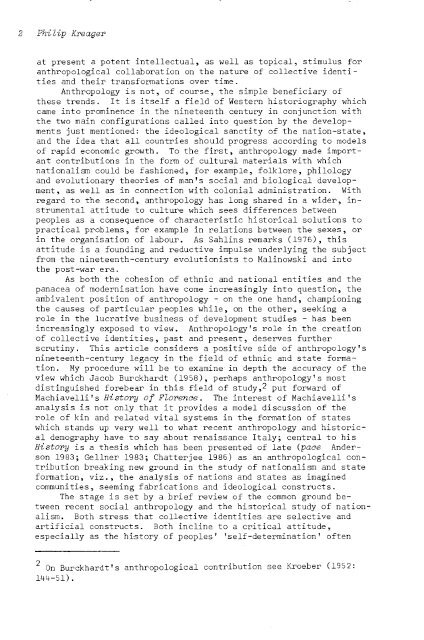CONTENTS NO.I - Institute of Social and Cultural Anthropology ...
CONTENTS NO.I - Institute of Social and Cultural Anthropology ...
CONTENTS NO.I - Institute of Social and Cultural Anthropology ...
Create successful ePaper yourself
Turn your PDF publications into a flip-book with our unique Google optimized e-Paper software.
2 Phi Zip Kreager<br />
at present a potent intellectual, as well as , stimulus for<br />
anthropological collaboration on the nature <strong>of</strong> collective identi<br />
ties <strong>and</strong> their transformations over time.<br />
<strong>Anthropology</strong> is not, <strong>of</strong> course, the beneficiary <strong>of</strong><br />
these trends. It is itself a field <strong>of</strong> Western historiography which<br />
came into prominence in the nineteenth century in conjunction with<br />
the two main configurations called into question by the developments<br />
just mentioned: the ideological sanctity <strong>of</strong> the nation-state,<br />
<strong>and</strong> the idea that all countries should progress to models<br />
<strong>of</strong> rapid economic growth. To the first, anthropology made important<br />
contributions in the form <strong>of</strong> cultural materials with which<br />
nationalism could be fashioned, for example, folklore, philology<br />
<strong>and</strong> evolutionary theories <strong>of</strong> man's social <strong>and</strong> biological<br />
ment, as well as in connection with colonial administration. With<br />
regard to the second, anthropology has long shared in a wider, instrumental<br />
attitude to culture which sees differences between<br />
as a consequence <strong>of</strong> characteristic historical solutions to<br />
practical problems, for example in relations between the sexes, or<br />
in the organisation <strong>of</strong> labour. As Sahlins remarks (1976), this<br />
attitude is a founding <strong>and</strong> reductive impulse underlying the subject<br />
from the<br />
evolutionists to Malinowski <strong>and</strong> into<br />
the post-war era.<br />
As both the cohesion <strong>of</strong> ethnic <strong>and</strong> national entities <strong>and</strong> the<br />
panacea <strong>of</strong> modernisation have come increasingly into<br />
, the<br />
ambivalent position <strong>of</strong> anthropology - on the one h<strong>and</strong>, championing<br />
the causes <strong>of</strong> particular peoples while, on the other,<br />
a<br />
role in the lucrative business <strong>of</strong> development studies - has been<br />
increasingly exposed to view. <strong>Anthropology</strong>'s role in the creation<br />
<strong>of</strong> collective identities, past <strong>and</strong> present, deserves further<br />
scrutiny. This article considers a positive side <strong>of</strong> anthropology's<br />
nineteenth-century legacy in the field <strong>of</strong> ethnic <strong>and</strong> state formation.<br />
My procedure will be to examine'in the accuracy <strong>of</strong> the<br />
view which Jacob Burckhardt (1958), perhaps anthropology's most<br />
distinguished forebear in this field <strong>of</strong> study,2 put forward <strong>of</strong><br />
Machiavelli's History <strong>of</strong> FZorence. The interest <strong>of</strong> Machiavelli's<br />
analysis is not only that it provides a model discussion <strong>of</strong> the<br />
role <strong>of</strong> kin <strong>and</strong> related vital systems in the formation <strong>of</strong> states<br />
which st<strong>and</strong>s up very well to what recent anthropology <strong>and</strong> historical<br />
demography have to say about renaissance Italy; central to his<br />
History is a thesis which has been presented <strong>of</strong> late (pace Anderson<br />
1983; Gellner 1983; Chatterjee 1986) as an anthropological contribution<br />
breaking new ground in the study <strong>of</strong> nationalism <strong>and</strong> state<br />
formation, viz., the <strong>of</strong> nations <strong>and</strong> states as imagined<br />
communities, fabrications <strong>and</strong> ideological constructs.<br />
The stage is set by a brief review <strong>of</strong> the common ground between<br />
recent social anthropology <strong>and</strong> the historical <strong>of</strong> nationalism.<br />
Both stress that collective identities are selective <strong>and</strong><br />
artificial constructs. Both incline to a critical attitude,<br />
especially as the <strong>of</strong> peoples' 'self-determination' <strong>of</strong>ten<br />
2 On Burckhardt's anthropological contribution see Kroeber (1952:<br />
144-51) .

















